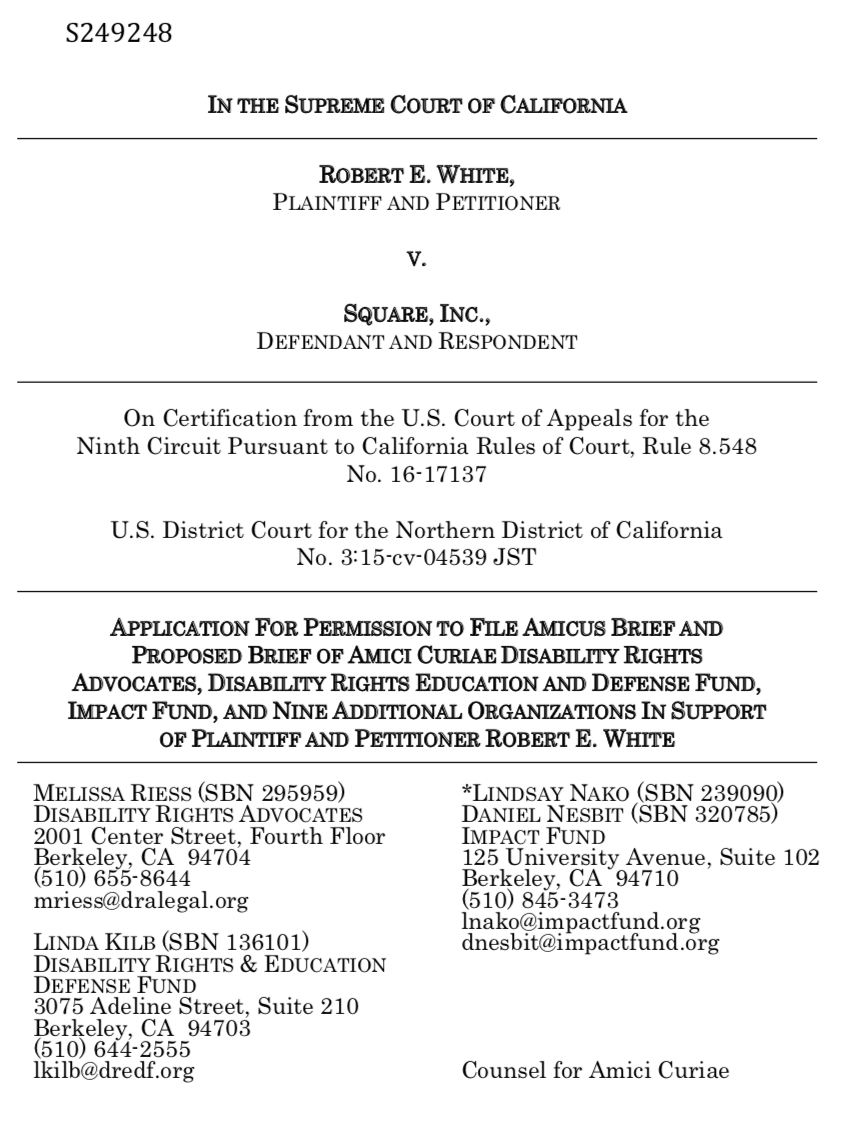California Supreme Court Ponders Digital Discrimination Case, White v. Square
Daniel Nesbit, Law Fellow - The Impact Fund
Many of our daily interactions are moving from the physical to the virtual. We shop, use services, find jobs, and socialize in the digital town square. Ushered in by rapid technological innovation, this shift raises important legal questions.
One such question is currently before the California Supreme Court in White v. Square, Inc. The Court is being asked to decide if someone can experience discrimination when they visit a website, face a barrier to full and equal access, and then leave without entering into a formal agreement with the business. Impact Fund, Disability Rights Advocates, Disability Rights Education and Defense Fund, and allied legal and advocacy organizations are encouraging the Court to answer with a resounding “YES.”
Plaintiff Robert White is a bankruptcy attorney who wanted to use Square, an internet-based service for accepting electronic payments, for his business. In the process of scoping out Square’s services, White realized that Square prohibited its use to accept payments related to certain businesses, including the practice of bankruptcy law. Because White intended to use Square for his bankruptcy practice, he refused to accept these terms and left the website without entering into a formal agreement with Square.
Can discrimination occur without an agreement or exchange between an online business and its users? We argue, ‘yes.’
White challenged the terms of Square’s seller agreement as a violation of the California Unruh Act’s ban on occupational discrimination. The federal district court held that White did not have standing under California law because he had not agreed to Square’s terms and conditions, and therefore had not been injured. On appeal, the Ninth Circuit concluded that the case raised new questions under California law that should be answered by the California Supreme Court – namely, can discrimination occur without an agreement or exchange between an online business and its users?
Along with Disability Rights Advocates and the Disability Rights Education and Defense Fund, the Impact Fund has written an amicus brief urging the California Supreme Court to recognize that turning users away through discriminatory terms of service or other actions is illegal discrimination, and that users who are deterred by discriminatory terms should be able to bring legal claims in court.
Our brief describes the historic role of California as a protector of civil rights and the broad anti-discrimination mandate of its current civil rights laws. Based on that historic role and broad mandate, we call on the California Supreme Court to adopt the federal “futile gesture” doctrine. For decades, federal courts have understood that discrimination has a deterrence effect. When you know that a business is likely to exclude or discriminate against you, you shouldn’t need to make a futile gesture in order to challenge that discriminatory policy in court. We argue that the “futile gesture” doctrine is critical to eradicating discrimination from our public spaces.
In our amicus brief, we also detail the promise – and pitfalls – of the developing technological landscape. People with disabilities are finding great opportunities for integration in new technologies, but these same innovations present new barriers. The internet offers marginalized communities unprecedented access to financial services, but only if the infrastructure remains open to all. Big data can help guide us through the digital marketplace to what is most relevant to our interests, but also allow for tools of precise discrimination.
We are honored and encouraged by the fact that Civil Rights Education and Enforcement Center, Disability Rights California, Disability Rights Legal Center, Law Foundation of Silicon Valley, Legal Aid at Work, Legal Services for Prisoners with Children, National Federation of the Blind, National Federation of the Blind of California, and Public Justice, P.C. joined our brief.
Our digital world is still under construction. Californians must be able to challenge discrimination and exclusion wherever it occurs. Courts should adapt to innovation and guarantee that our civil rights laws continue to offer protection in the digital age.
UPDATE 08.12.19: WE WON!
The California Supreme Court issued a unanimous decision holding that “a person who visits a business’s website with intent to use its services and encounters terms or conditions that exclude the person from full and equal access to its services has standing under the Unruh Civil Rights Act, with no further requirement that the person enter into an agreement or transaction with the business.” The Court prefaces its discussion of standing by placing the issue in the context of the Unruh Act’s broad remedial purpose. In reviewing a variety of lower court decisions addressing standing, the Court declined to adopt a narrower view of standing requiring that plaintiffs enter into an agreement or transaction with the business. We were happy to see the Court cite approvingly to the federal courts’ “futile gesture” doctrine. This decision resolves important questions about enforcement of civil rights laws online and affirms a commitment to full, equal access in the internet age. Congratulations to the Moskovitz Appellate Team who represented the plaintiff in this case!




